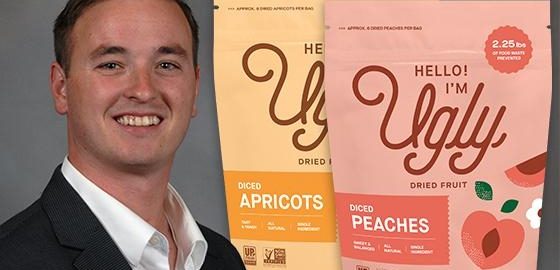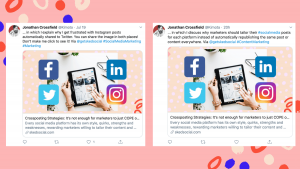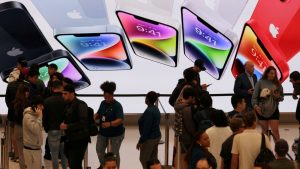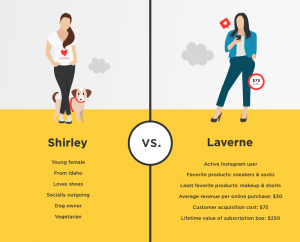Selling Ugly: Branding With a Hint of Irony
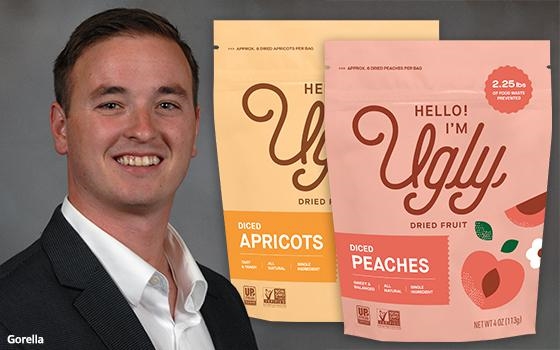
Since the era of fruit carts selling oranges on Main Street, marketers have known that beauty, freshness, uniformity, delectability are what sell the goods. There is a new category of sustainable food and store brands like Misfit Market and Imperfect Foods that take direct aim at these conventions with a more irony approach to food branding. Our obsession with good looks over good taste and nutrition has led to massive food waste. The Ugly Company ups the ironic branding another notch, but it is following a similar path. This dried fruit snack firm addresses the food waste problem by “upcycling” produce, like cherries, peaches, and apricots, that might have been discarded simply for cosmetic or size reasons. Hence ugly fruit. You can listen to the entire podcast at this link.
The company is starting to take off both at retail and wholesale. It is partnering with other upcycling brands like Misfit and Imperfect but is also spreading its tasty ugliness at retail. You can find its colorful packages now at Sprouts supermarkets and select REI, Whole Foods, and Kroger-owned brands. Their Chief Brand Officer Matt Gorella understands the food supply chain intimately. He grew up on a vineyard in Fowler, California, where his family supplied Sun-Maid with raisins for 50 years, and he also spent several years marketing at Gallo before going to Ugly.
MediaPost: You lean into the “Ugly” concept in a fruit category that typically sells its freshness on looks. What have you learned about taking that sort of playful, self-deprecating approach to brand building?
Matt Gorella: We found a lot of consumers react very positively to it. There’s a select group of consumers that see the name Ugly and are turned off by it. But I’d say the vast majority of people get a chuckle, smile, or are intrigued by it because as you mentioned it really hasn’t been done in a big way before, really embracing this concept of ugly. So, we find that people are curious. They want to know more about our brand, which really sets us up to tell our brand story in a meaningful way.
MP: How much of the business is DTC versus wholesale now?
Gorella: We do about 25-30% DTC. That’s through our own website. We also go through some third parties. A lot of people are familiar with Imperfect Foods and Misfits Markets. We sell to them. We think that they’re doing a great job helping push the upcycle movement forward and highlight the benefits of eating ugly fruit. Most of our business on the DTC side goes through them, and then the other 70% is through those retailers that you described earlier.
MP: How much have you spent on media so far?
Gorella: Less than $10,000.
MP: But I heard about you even before we connected. How did you build a brand and some degree of recognition without any media spend?
Gorella: I think a big part of it’s been storytelling. Everybody’s heard of these startups, an entrepreneur looking for a problem to solve, so they can build this brand and sell it off. That’s very different from who we are. We saw this problem, we’ve lived this problem firsthand, and we wanted to find a solution for it. We want to bring something to the Central Valley that we can all be really proud of and help prevent food waste. So, I think, telling that story in different ways, whether it be through our web, whether it be through our social media channels, and really channeling that to retailers. And taking them through how we came to this, why this product is different from others. It’s a single ingredient; it’s literally just the fruit in the pack. We don’t add any additives preservatives, no sugar. So I think, from an overall marketing standpoint, it’s really just been word of mouth, it’s been telling our story, and people resonate with the story. It’s really interesting to watch how a brand with a strong story can really start to make way around the marketplace.
MP: I want to move into that wholesale relationship now. Meaningful branding isn’t necessarily that meaningful to retailers who are looking at the bottom line. What resonates for them? They’ve got a lot of different healthy choices out there, a lot of DTCs that are moving into retail with a lot of messaging.
Gorella: I think there’s really two major things. One is they’re feeling a lot of pressure from consumers to react and to find solutions to food waste. The problem of food waste around the United States is becoming more and more of a known fact. 30 to 40% of our food supplies are thrown out, which is a staggering number. And it just makes sense from a sustainability standpoint if we can just use more of the food that we have. We have a lesser impact on the environment. So, we find there’s a lot of retailers that have pretty lofty stated goals. So, for Kroger it’s zero hunger, zero waste. This is kind of their mandate, their promise to address hunger and to prevent food waste. Well, we go into those meetings and say, hey, we know you have these lofty sustainability goals, and consumers are looking for you to find solutions to this. So, we can be a partner for you to accomplish those goals. Every bag that we sell prevents some pound amount of food waste. And then it gets passed on to the retailer as well. And that gets them really excited about the opportunity to speak out about their sustainability goals, and how they’re pushing things forward.
MP: Do the economics of retail make sense for you guys?
Gorella: It’s very challenging to make the ends meet on margins with all the different kinds of cuts you take along the way. I mean, we face distributor fees, required promos, required activations within the retailer. There are so many things that kind of add up to say, how much did we actually make at the end of this? But it also depends retailer to retailer. Some retailers we feel really good in, we have a great margin, they’re getting their margin, but obviously that’s floating up to a little bit of a higher price. So, where we’re challenged is when you get to kind of the everyday consumer type stores around us. Think about Walmart from a broader spectrum. That’s where the margin starts to get really compressed, and we have to make some tradeoffs to say, hey we want to be in Walmart. It’s going to get us tremendous reach, it’s a huge retailer that a lot of consumers are shopping at, but then there’s a tradeoff of we’re really not making this kind of margin that we want to.
But we’re also helping improve our margins through opening our own plants. So, one of the big challenges in this kind of brand is that there really hasn’t been a process to accept this fruit and manufacture this fruit. One of the first things that happens in the packing house is a sticker is put on the piece of fruit. Obviously, we can’t process it that way, so we’re going through by hand, taking off that sticker and then obviously processing it after that. Well, we’re building modern manufacturing, specifically built to accept this type of fruit. We’re going to be able to automate taking that sticker off, we’re going to be able to kind of take the different steps along the path. For instance, in the packing house, and just in fresh fruit, in general, they really rely on uniformity. Everything needs to be the same size because they’re going through a similar process. They pack it to the right weight in the boxes. Well, that’s just not how it comes as a fruit. There are different shapes and sizes, and it’s misshapen, it’s deformed, whatever it may be. So, we also have implemented processes in our line that can quickly and nimbly change sizing too so we can still get a consistent product. But it’s accounting for the different sizes of the fruit that we’re facing. So, all of those different changes one is going to help us create an even more quality product, but two, it’s helping us with our efficiency so that we can make it more economical as we’re continuing to expand in our retail presence.
(3)
